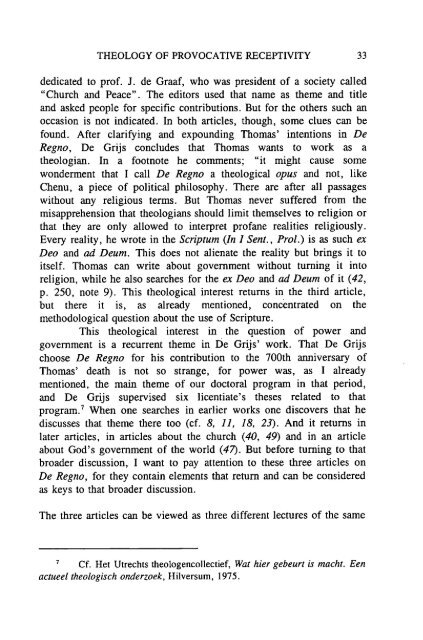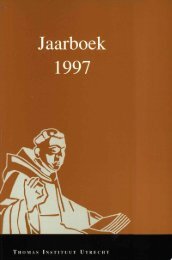Jaarboek Thomas Instituut 1995 - Thomas Instituut te Utrecht
Jaarboek Thomas Instituut 1995 - Thomas Instituut te Utrecht
Jaarboek Thomas Instituut 1995 - Thomas Instituut te Utrecht
You also want an ePaper? Increase the reach of your titles
YUMPU automatically turns print PDFs into web optimized ePapers that Google loves.
THEOLOGY OF PROVOCATIVE RECEPTIVITY 33<br />
dedica<strong>te</strong>d to prof. J. de Graaf, who was president of a society called<br />
"Church and Peace". The editors used that name as theme and title<br />
and asked people for specific contributions. But for the others such an<br />
occasion is not indica<strong>te</strong>d. In both articles, though, some clues can be<br />
found. Af<strong>te</strong>r clarifying and expounding <strong>Thomas</strong>' in<strong>te</strong>ntions in De<br />
Regno, De Grijs concludes that <strong>Thomas</strong> wants to work as a<br />
theologian. In a footno<strong>te</strong> he comments; "it might cause some<br />
wonderment that I calI De Regno a theological opus and not, like<br />
Chenu, a piece of political philosophy. There are af<strong>te</strong>r all passages<br />
without any religious <strong>te</strong>rms. But <strong>Thomas</strong> never suffered from the<br />
misapprehension that theologians should limit themselves to religion or<br />
that they are only allowed to in<strong>te</strong>rpret profane realities religiously.<br />
Every reality, he wro<strong>te</strong> in the Scriptum (In I Sent., Prol.) is as such ex<br />
Deo and ad Deum. This does not aliena<strong>te</strong> the reality but brings it to<br />
itself. <strong>Thomas</strong> can wri<strong>te</strong> about government without turning it into<br />
religion, while he also searches for the ex Deo and ad Deum of it (42,<br />
p. 250, no<strong>te</strong> 9). This theological in<strong>te</strong>rest returns in the third article,<br />
but there it is, as already mentioned, concentra<strong>te</strong>d on the<br />
methodological question about the use of Scripture.<br />
This theological in<strong>te</strong>rest in the question of power and<br />
government is a recurrent theme in De Grijs' work. That De Grijs<br />
choose De Regno for his contribution to the 700th anniversary of<br />
<strong>Thomas</strong>' death is not so strange, for power was, as I already<br />
mentioned, the main theme of our doctoral program in that period,<br />
and De Grijs supervised six licentia<strong>te</strong>'s theses rela<strong>te</strong>d to that<br />
program." When one searches in earlier works one discovers that he<br />
discusses that theme there too (cf. 8, 1/, 18, 23). And it returns in<br />
la<strong>te</strong>r articles, in articles about the church (40, 49) and in an article<br />
about God's government of the world (47). But before turning to that<br />
broader discussion, I want to pay at<strong>te</strong>ntion to these three articles on<br />
De Regno, for they contain elements that return and can be considered<br />
as keys to that broader discussion.<br />
The three articles can be viewed as three different lectures of the same<br />
Cf. Het <strong>Utrecht</strong>s theologencollectief, Wat hier gebeurt is macht. Een<br />
actueel theologisch onderzoek, Hilversum, 1975.








